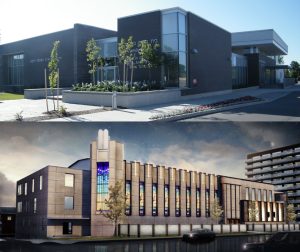 TORONTO —Camp Ramah in Canada is celebrating its 50th year with a weekend-long reunion Nov. 12 to 14, at Toronto’s Beth Tzedec Congregation.
TORONTO —Camp Ramah in Canada is celebrating its 50th year with a weekend-long reunion Nov. 12 to 14, at Toronto’s Beth Tzedec Congregation.
Former campers to gather for reunion Nov. 12-14.
The weekend will kick off with Friday night dinner “Ramah style,” and will feature Los Angeles-based Craig Taubman, a former Ramah Canada staffer, singing in concert as part of a Saturday night gala banquet fundraiser honouring the Flatt and Wolfe families. As well, morning Shabbat services will be followed by an enhanced Kiddush, and havdalah services will also be conducted Ramah-style.
Money raised will be put toward scholarships for camp enrolment fees, said Ramah’s development director, Ilana Hirt. “We’re looking to raise about $100,000 for kids who are in need of a scholarship.”
Michael Wolf, Ramah’s director for the past eight years, “grew up at the camp,” he said. The 45-year-old Pittsburgh native, who now lives in Detroit, noted that the camp serves between 400 and 450 youngsters per session, not just from Ontario, but from Montreal, western Pennsylvania, upstate New York and Michigan.
Ramah is “based on Jewish values, but we do all kinds of life skills,” Wolf said. “We’re known for our waterfront – waterskiing, sailing, canoeing, swimming. We have a brand new sports field, and we offer a whole lot of different hobbies.
“What makes us unique is the spirit and Jewish values. It’s Conservative Jewish, but we have campers from Conservative and Orthodox congregations, and some Reform… [but] I think like most good camps, the thing we generate is friendships. Lifelong friendships are formed each summer at camp.
“It’s exciting to be able to reconnect live, not just through Facebook.”
Reunion chair Howard Slepkov, who lives in St. Catharines, is a former longtime Ramah parent and has been on the camp’s board for 12 years. He hopes that alumni with growing families will rekindle friendships at the reunion and remember “how important Ramah was to them.”
Jewish camping is “a formative experience,” said Slepkov, who is an educator.
Rabbi Mitch Cohen – director of the New York-based National Ramah Commission and former director of Ramah Canada for 11 years until 2000, said that Ramah has a “probably the most beautiful natural setting of any of the camps.” As well, he added, a combination of the environment and the young staff who serve as role models have a lifelong impact, inspiring Jewish identity and commitment.
“The key to successful Jewish identity-building is social relationships, friendships,” he said. For that reason, it also impacts the other ten months of the year, he explained.
Rabbi Cohen said that, as much as he’s gained from serving the camp, he especially appreciates the “powerful impact” it has had on his children.
It’s very appropriate that the reunion is being held at Beth Tzedec, because the synagogue was where it all started for the camp, said Ab Flatt, a reunion honoree with his wife Phyllis and brother- and sister-in-law Harold and Carole Wolfe. Ramah – more formally known as Camp Ramah in Canada, the Max and Beatrice Wolfe Campus – is named for Phyllis’ and Harold’s parents.
Ab, a former camp chair who has been involved with Ramah for about 40 years, said Beth Tzedec’s then rabbi – Stuart Rosenberg, who died in 1990 – was one of the camp’s founders.
Rabbi Rosenberg and the late J. Barney Goldhar, a congregant who would become the camp’s first chair and whose daughter had attended a Ramah camp in the United States, approached the Jewish Theological Seminary, which oversees Ramah camps, for permission to open Canada’s first and so far only Ramah camp.
Founders purchased the site of the former Camp Winnebago with funding from 11 Conservative synagogues in Ontario and Quebec, said Flatt. The three major supporters were Beth Tzedec and Beth Sholom Synagogue in Toronto, and Congregation Shaar Hashomayim in Montreal, he added.
“It’s a wonderful camp with great Jewish values,” said Flatt, whose four children are Ramah alumni and whose 14 grandchildren of camp age have attended the camp.
Some people think that kids who attend Jewish day school don’t need a Jewish overnight camp, or that it’s “too religious,” he noted. But, he said, a camp such as Ramah means “living Jewishly 24 hours a day.
“One is living,” he clarified. “One is theory.”






